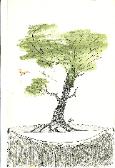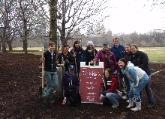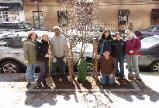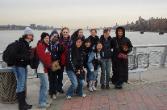



The “Urban Environments” independent study/seminar course is a Service Learning course focused on cities, a unique kind of social-ecological system. We explore examples of how cities shape their environment, how the urban environment affects those living in it, and how people in cities have created initiatives that improve both the urban environment and their own individual and community quality of life. With an eye towards how we can work with our fellow citizens in cities, we look at five examples of initiatives to improve or understand Urban Environments, including: (1) urban horticulture and community gardening, and greening (2) urban forestry, (3) urban wildlife, (4) urban fisheries and (5) green architecture and landscaping. Three themes are intertwined throughout the five examples: urban environmental education, community greening, and urban development. These three themes encompass issues such as environmental policy, environmental justice, and sustainable development, among others. The course highlight is a one week trip to New York City to investigate these themes and get involved in community action and public service related to urban natural resources and civic ecology. Linked resources and readings available in the COURSE SYLLABUS. Keith G. Tidball, “Urban Environments: Service Learning Towards Urban Sustainability,” Extending our Reach: Voices of Service Learning at Cornell, Faculty Fellows in Service, Cornell University, Fall 2007. Keith G. Tidball and Marianne Krasny, “Creating Garden Mosaics, Piece by Piece,” Cornell Plantations Magazine, Summer/Fall 2006. Keith G. Tidball, “Birds in Community Gardens,” BirdScope, Winter, Vol. 21, No. 1, pg 11, 2007. Cornell Laboratory of Ornithology. Keith G. Tidball, "Urban Environments: A Service Learning Course in New York City to Foster Urban SES Resilience." Paper presentation and workshop at meetings of the Resilience Alliance, “Resilience 2008,” Stockholm, Sweden: April 2008 |


Urban Environments Service Learning Course
"Resilient Green"



